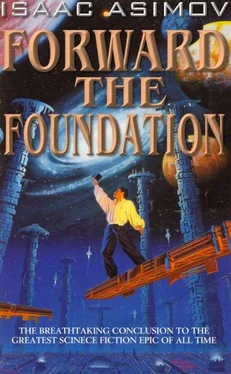The mere fact that Dors was causing him to think about the matter was breaking the agreement that had kept them in peace and comfort all these years and he felt a faint but growing resentment at that.
But he pushed those thoughts, the questions, away again. He had learned to accept her role as his protector and would continue to do so. After all, it was he with whom she shared a home, a table, and a bed—not Eto Demerzel.
Dors’s voice brought him out of his reverie.
“I said— Are you sulking, Hari?”
He started slightly, for there was the sound of repetition in her voice, and he realized he had been shrinking steadily deeper into his mind and away from her.
“I’m sorry, dear. I’m not sulking. —Not deliberately sulking. I’m just wondering how I ought to respond to your statement.”
“About robots?” She seemed quite calm as she said the word.
“You said I don’t know as much about them as you do. How do I respond to that?” He paused, then added quietly (knowing he was taking a chance), “That is, without offense.”
“I didn’t say you didn’t know about robots. If you’re going to quote me, do so with precision. I said you didn’t understand about robots. I’m sure that you know a great deal, perhaps more than I do, but to know is not necessarily to understand.”
“Now, Dors, you’re deliberately speaking in paradoxes to be annoying. A paradox arises only out of an ambiguity that deceives either unwittingly or by design. I don’t like that in science and I don’t like it in casual conversation, either, unless it is meant humorously, which I think is not the case now.”
Dors laughed in her particular way, softly, almost as though amusement were too precious to be shared in an overliberal manner. “Apparently the paradox has annoyed you into pomposity and you are always humorous when you are pompous. However, I’ll explain. It’s not my intention to annoy you.” She reached over to pat his hand and it was to Seldon’s surprise (and slight embarrassment) that he found that he had clenched his hand into a fist.
Dors said, “You talk about psychohistory a great deal. To me, at any rate. You know that?”
Seldon cleared his throat. “I throw myself on your mercy as far as that’s concerned. The project is secret—by its very nature. Psychohistory won’t work unless the people it affects know nothing about it, so I can talk about it only to Yugo and to you. To Yugo, it is all intuition. He’s brilliant, but he is so apt to leap wildly into darkness that I must play the role of caution, of forever pulling him back. But I have my wild thoughts, too, and it helps me to be able to hear them aloud, even”—and he smiled—“when I have a pretty good notion that you don’t understand a word I’m saying.”
“I know I’m your sounding board and I don’t mind. —I really don’t mind, Hari, so don’t begin making inner resolutions to change your behavior. Naturally I don’t understand your mathematics. I’m just a historian—and not even a historian of science. The influence of economic change on political development is what is taking up my time now—”
“Yes, and I’m your sounding board on that or hadn’t you noticed? I’ll need it for psychohistory when the time comes, so I suspect you’ll be an indispensable help to me.”
“Good! Now that we’ve settled why you stay with me—I knew it couldn’t be for my ethereal beauty—let me go on to explain that occasionally, when your discussion veers away from the strictly mathematical aspects, it seems to me that I get your drift. You have, on a number of occasions, explained what you call the necessity of minimalism. I think I understand that. By it, you mean—”
“I know what I mean.”
Dors looked hurt. “Less lofty, please, Hari. I’m not trying to explain it to you. I want to explain it to myself. You say you’re my sounding board, so act like one. Turnabout is fair play, isn’t it?”
“Turnabout is fine, but if you’re going to accuse me of loftiness when I say one little—”
“Enough! Shut up! —You have told me that minimalism is of the highest importance in applied psychohistory; in the art of attempting to change an undesired development into a desired one or, at any rate, a less undesired one. You have said that a change must be applied that is as minute, as minimal, as possible—”
“Yes,” said Seldon eagerly, “that is because—”
“ No , Hari. I’m trying to explain. We both know that you understand it. You must have minimalism because every change, any change, has myriad side effects that can’t always be allowed for. If the change is too great and the side effects too many, then it becomes certain that the outcome will be far removed from anything you’ve planned and that it would be entirely unpredictable.”
“Right,” said Seldon. “That’s the essence of a chaotic effect. The problem is whether any change is small enough to make the consequence reasonably predictable or whether human history is inevitably and unalterably chaotic in every respect. It was that which, at the start, made me think that psychohistory was not—”
“I know, but you’re not letting me make my point. Whether any change would be small enough is not the issue. The point is that any change greater than the minimal is chaotic. The required minimum may be zero, but if it is not zero, then it is still very small—and it would be a major problem to find some change that is small enough and yet is significantly greater than zero. Now, that, I gather, is what you mean by the necessity of minimalism.”
“More or less,” said Seldon. “Of course, as always, the matter is expressed more compactly and more rigorously in the language of mathematics. See here—”
“Save me,” said Dors. “Since you know this about psychohistory, Hari, you ought to know it about Demerzel, too. You have the knowledge but not the understanding, because it apparently doesn’t occur to you to apply the rules of psychohistory to the Laws of Robotics.”
To which Seldon replied faintly, “Now I don’t see what you’re getting at.”
“He requires minimality, too, doesn’t he, Hari? By the First Law of Robotics, a robot can’t harm a human being. That is the prime rule for the usual robot, but Demerzel is something quite unusual and for him, the Zeroth Law is a reality and it takes precedence even over the First Law. The Zeroth Law states that a robot can’t harm humanity as a whole. But that puts Demerzel into the same bind in which you exist when you labor at psychohistory. Do you see?”
“I’m beginning to.”
“I hope so. If Demerzel has the ability to change minds, he has to do so without bringing about side effects he does not wish—and since he is the Emperor’s First Minister, the side effects he must worry about are numerous, indeed.”
“And the application to the present case?”
“Think about it! You can’t tell anyone—except me, of course—that Demerzel is a robot, because he has adjusted you so that you can’t. But how much adjustment did that take? Do you want to tell people that he is a robot? Do you want to ruin his effectiveness when you depend on him for protection, for support of your grants, for influence quietly exerted on your behalf? Of course not. The change he had to make then was a very tiny one, just enough to keep you from blurting it out in a moment of excitement or carelessness. It is so small a change that there are no particular side effects. That is how Demerzel tries to run the Empire generally.”
“And the case of Joranum?”
“Is obviously completely different from yours. He is, for whatever motives, unalterably opposed to Demerzel. Undoubtedly, Demerzel could change that, but it would be at the price of introducing a considerable wrench in Joranum’s makeup that would bring about results Demerzel could not predict. Rather than take the chance of harming Joranum, of producing side effects that would harm others and, possibly, all of humanity, he must leave Joranum alone until he can find some small change—some small change—that will save the situation without harm. That is why Yugo is right and why Demerzel is vulnerable.”
Читать дальше











